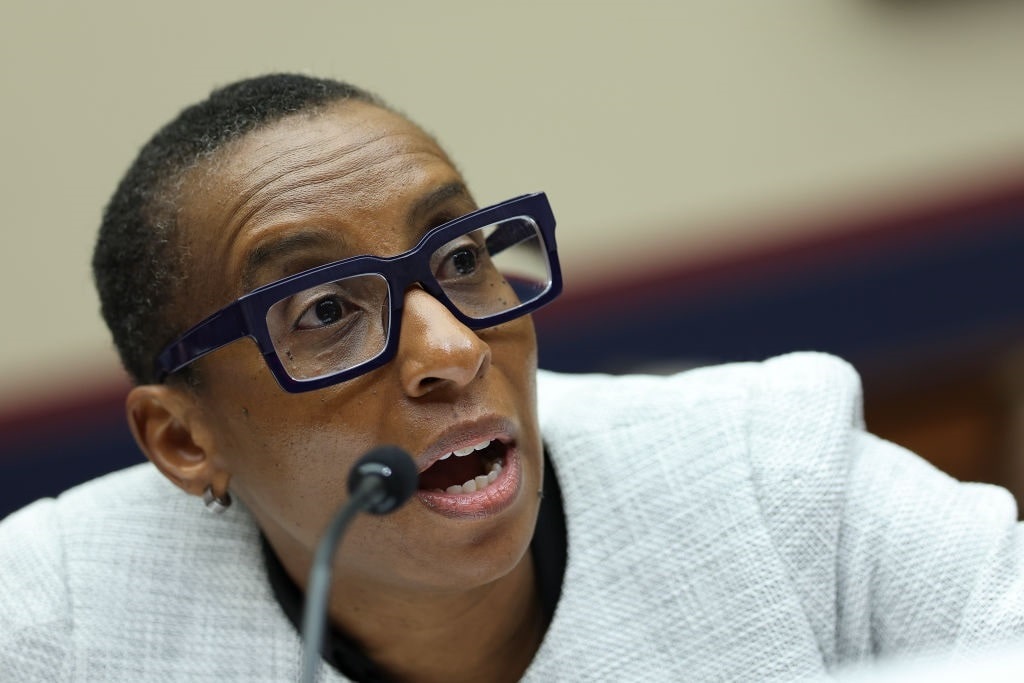It wasn’t until the klieg lights finally dimmed at a House Education Committee hearing following the testimony of three Ivy League presidents that the real fireworks began. The University of Pennsylvania board showed courage and took out its president, M. Elizabeth Magill, posthaste after a ghastly performance in front of the House committee regarding pro-Palestinian protests on campus. But the powers that be at arguably the most prestigious “Poison” Ivy did not show the same bravery and chose to stand behind their president, Claudine Gay. This lack of moral fortitude ultimately did them no good – and potentially did more harm – as Gay signaled she had had enough of the spotlight and handed in her resignation yesterday (Jan. 2). But it wasn’t for her wretched testimony; the former Harvard president was caught appropriating others’ work as her own.
Claudine Gay and the ‘P’ word
Without so much as a beat, Gay came under fire for plagiarism. What began with a drip, drip, drip of evidence ended in a flood of accusations, with calls for her to stand down from her lofty perch at Harvard. Senior fellow at the Manhattan Institute Christopher F. Rufo and Christopher Brunet of The American Conservative were the first to question Gay’s academic work. The duo predictably endured personal attacks from the left, but the examples they cited demonstrating the extent to which Gay lifted portions of others’ work were hard to ignore.

Claudine Gay (Photo by Kevin Dietsch/Getty Images)
Leave it to CNN to devise the most bizarre explanations for accusations leveled at Harvard’s former president. In a breaking news segment, reporter Matt Egan pitched this to the cable news faithful: “We should note that Claudine Gay has not been accused of stealing anyone’s ideas in any of her writings. She has been accused of sort of more like copying other people’s writings without attribution. So, it’s been more sloppy attribution than stealing anyone’s ideas.” First of all, Egan is factually incorrect because Gay has been accused of taking others’ ideas, and, second, what does “sort of more like copying other people’s writings without attribution” mean if not plagiarism?
The final nail in the proverbial coffin came on New Year’s Day when The Washington Free Beacon piled on with a story that added six new allegations of plagiarism to the 40-plus other instances that had already been made public. The Beacon displayed scandalous examples of how Gay plagiarized University of Wisconsin Professor David Canon in an animated graphic.
Despite multiple examples of plagiarism, the Wisconsin professor had an odd reaction to his work being appropriated by Gay, telling The Beacon, “This isn’t even close to an example of academic plagiarism.” But others took umbrage with the Harvard president’s theft of their intellectual property.
The Race Card Is Played
Only two paragraphs into her letter of resignation, Gay intoned, “Amidst all of this, it has been distressing to have doubt cast on my commitments to confronting hate and to upholding scholarly rigor — two bedrock values that are fundamental to who I am — and frightening to be subjected to personal attacks and threats fueled by racial animus.”
Perhaps Gay has been subject to some unknown “racial animus” because it is difficult, if not impossible, to make the case that her practice of pirating others’ words and/or ideas has anything to do with her race. Particularly damning was a reaction from retired Vanderbilt professor Dr. Carol Swain, a black female academic who went after Gay hammer and tong. Outraged, Swain called on Gay to be “fired … posthaste,” turning the race card back on the former Harvard president.
“Have a sit-down conversation with the people who have been harmed by the plagiarism of Gay and the system that protects her. Recognize that Harvard’s systematic racism and classism have far-reaching effects,” Swain wrote in an X post. In response to Gay’s resignation letter, Swain said, “What we have here is an effort to avoid accountability.”
Gay’s tenure as Harvard president lasted only six months and two days. Her interim replacement has already been found – economist and physician Professor Alan Garber – and she will remain in the paid employ of her alma mater in a reduced role.

